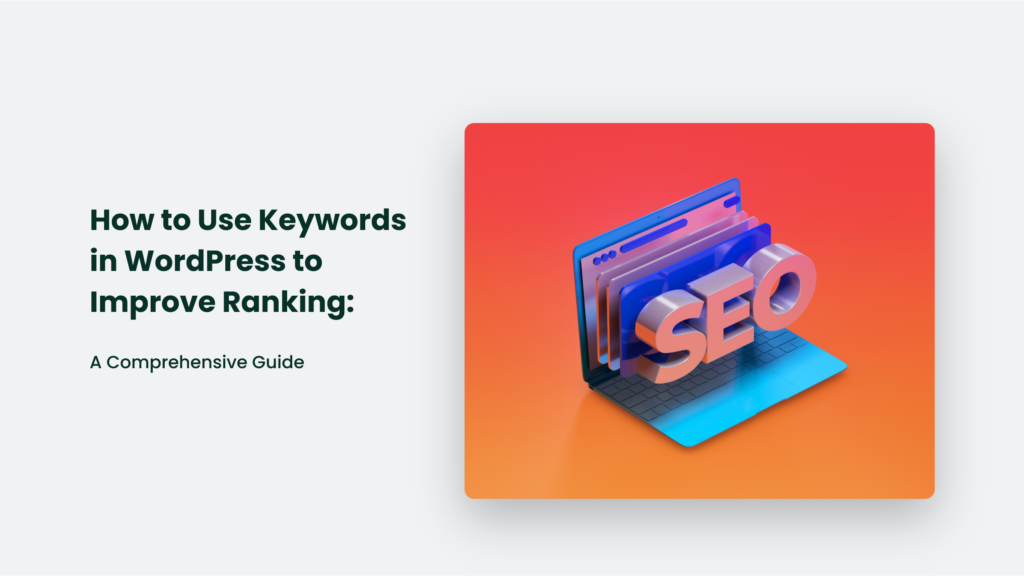As a WordPress enthusiast who’s spent countless hours tinkering with websites, I’ve learned that keywords are the secret sauce to boosting your site’s visibility. Remember that time you searched for the “best chocolate chip cookie recipe” and ended up on page 7 of Google? Yeah, we don’t want that for your website.
Let’s dive into the world of WordPress SEO and keyword optimization to ensure your content shines bright on the first page of search results. So, let’s learn more about how to use keywords in WordPress to improve ranking.

Why Keywords Matter in WordPress
Keywords bridge what people are searching for and the content you’re providing. They’re like the breadcrumbs that lead hungry searchers straight to your digital doorstep. In fact, websites that appear on the first page of Google search results receive a whopping 95% of web traffic. That’s a lot of potential visitors you don’t want to miss out on!
How to Use Keywords in WordPress to Improve Ranking
The Keyword Research Dance
Before sprinkling keywords like confetti, we need to know which ones to use. It is where keyword research comes in handy.
- Use keyword research tool.: Google Keyword Planner, SEMrush, or Ahrefs are great options for discovering high-volume keywords with moderate to low competition.
- Analyze your competitors: See what keywords they’re ranking for and consider how you can do it better.
- Think like your audience: What terms would they use to find your content?
- Focus on long-tail keywords: These are longer, more specific phrases that can help you target niche audiences.
Crafting Your Content Around Keywords
Now that you’ve got your keywords, it’s time to use them. But remember, we’re not just stuffing keywords like a Thanksgiving turkey—we’re strategically placing them for maximum impact.
Title Tags: Your First Impression
Your title tag is like a handshake with search engines. Make it firm, confident, and keyword-rich. For example:
<title>How to Use Keywords in WordPress to Improve Ranking | SEO Guide</title>
Meta Descriptions: The Elevator Pitch
Think of your meta description as your 160-character elevator pitch. It should include your primary keyword and entice users to click. For instance:
<meta name=”description” content=”Learn how to use keywords in WordPress to improve ranking and boost your SEO. Our comprehensive guide offers expert tips and tricks for optimizing your content.”>
Headings: The Roadmap of Your Content
Use the keywords in your headings (H1, H2, H3) to structure your content and signal its relevance to search engines. Like this:
<h1>How to Use Keywords in WordPress to Improve Ranking</h1> <h2>Mastering Keyword Placement in Your WordPress Posts</h2> <h3>Optimizing Your Images with Keywords</h3>
WordPress Plugins: Your SEO Sidekicks
WordPress plugins can be your best friends when it comes to SEO. Here are a few that can help you optimize your keyword usage:
- Yoast SEO: This plugin is like having an SEO expert on your team. It provides real-time content analysis and suggestions for improvement.
- All in One SEO Pack: Another powerful tool that helps you optimize your titles, meta descriptions, and content for your target keywords.
- Rank Math: A newer player in the game, but it’s quickly gaining popularity for its user-friendly interface and comprehensive features.
The Art of Internal Linking
Internal linking is like creating a web of connections within your site. It helps search engines understand your site structure and spreads link equity. When you’re writing a new post, always look for opportunities to link to your existing content using relevant anchor text.
Image Optimization: A Picture is Worth a Thousand Keywords
Don’t forget about your images! Use descriptive, keyword-rich file names and alt text. For example:
<img src=”how-to-use-keywords-in-wordpress.jpg” alt=”Using keywords in WordPress to improve SEO ranking”>
Mobile Optimization: Because Size Matters
With mobile devices accounting for 54.8% of global website traffic in 2021, ensuring your WordPress site is mobile-friendly is crucial. Google’s mobile-first indexing means that the mobile version of your site is considered the primary version for ranking purposes.
The Need for Speed
Page speed is a ranking factor and crucial for user experience. To speed up your site, optimize your images, use a caching plugin, and consider a content delivery network (CDN).
Keeping It Fresh: The Content Update Strategy
Search engines love fresh content. Regularly updating your existing posts with new information and keywords can boost their rankings. It’s like giving your content a facelift without the hefty price tag!
The Bottom Line:
In conclusion, using keywords effectively in WordPress is an art and a science. It requires research, strategy, and a bit of creativity. But with these tips and tricks up your sleeve, you’re well on your way to climbing those search engine rankings. Remember, SEO is a marathon, not a sprint. Stay consistent, keep learning, and watch your WordPress site soar to new heights!
Frequently Asked Questions:
How many keywords should I use in a single post?
Focus on one primary keyword and 2-3 related secondary keywords per post. Quality over quantity!
Can I use the same keyword on multiple pages?
Yes, but it’s better to target different keywords for each page to avoid competing with yourself.




